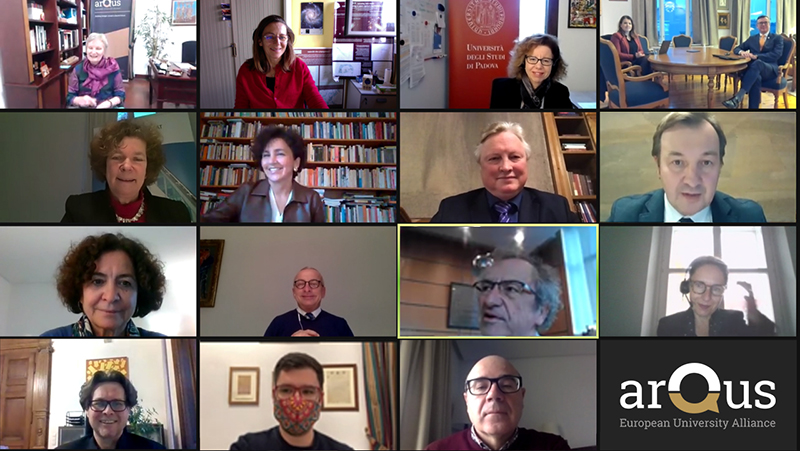During the second meeting of the Rectors’ Council, the rectors of the 7 Arqus universities restated their firm commitment to reaching the highest mobility rates together with their strong ambition in the development of joint programmes. The rectors of the Universities of Bergen, Granada, Graz, Leipzig, Lyon, Padua and Vilnius met yesterday, November 26th, 2020, in the second Rectors’ Council meeting, to analyse the goals achieved during the first year of the Alliance, the challenges faced, how the COVID-19 pandemic may have affected the work plan of the Alliance and other issues.
One of the most relevant highlights of this meeting was the reaffirmation of the rectors’ commitment to seamless mobility among the 7 universities and to the development in the short term of all kinds of joint programmes, including both the three planned pilot joint Master’s programmes as well as short modules, online and blended learning opportunities. To support this important commitment, a pathfinder group composed of experts in international mobility at each university was set up in September. This group is also helping in the implementation of the Open Mobility Agreement signed in 2019 and already in place for this academic year, that allows the free student mobility between universities without the need for specific faculty-level agreements.
Students are key players
The rectors of the 7 Arqus universities, further expressed their pride at the level of student participation and engagement within the Alliance and, as a way to foster their involvement even further, agreed to set up consultation opportunities for the Rectors with student representatives on Alliance issues concerning them.
Annual conference postponed to fall 2021.
Due to the current situation regarding the COVID-19 pandemic, the Rectors’ Council decided to postpone the Annual conference planned for 3rd-5th May 2021 in Vilnius to the autumn of 2021. The community building and networking opportunities offered by this event are essential for the optimal progress of the Alliance and this may not be possible yet in May, when pandemic restrictions may be still in place in many countries.
Internal organizational issues
The Rectors’ Council approved the drawing up of a single foundational statutory document covering all basic aspects of the workings of the Alliance. Furthermore, a Vice Rectors’ Council is to be set up to complement existing governance structures. The rectors also thanked the more than 550 active participants in the Arqus Alliance for their excellent work during this year despite the difficulties arising from the COVID-19 pandemic.
About Arqus
The Arqus European University Alliance brings together the universities of Bergen, Granada, Graz, Leipzig, Lyon, Padova and Vilnius, seven longstanding comprehensive research universities who share extensive experience in joint projects in many fields, and a common profile as internationalized institutions with deep regional engagement in medium-sized cities. The Arqus European University Alliance aspires to build on the member universities’ sound prior experience in cooperation in order to achieve a high level of integration in its members’ policies and action plans in order to:
● enhance the education of critically engaged European and global citizens who are able and willing to contribute to a multicultural, multilingual and inclusive Europe which is open to the world;
● increase and improve the joint research capacity of the partner universities;
● better respond to the grand societal challenges of the 21st century in Europe and beyond.
The principal ambition of the Arqus Alliance is to act jointly as a laboratory for institutional learning from which to move forward in the design, testing and implementation of an innovative model for deep inter-university cooperation. The Alliance aims to consolidate a joint governance structure to facilitate the development of consensual joint policies and action plans, to consolidate participative structures to facilitate cross-cutting integration at all levels of the partner institutions, and to share its experience with other groupings in order to communicate the added value to be found in its model of integration.
The Arqus Alliance aims to centre its efforts on enabling people: enabling a widely diverse student body and enhancing their learning experience; enabling a similarly diverse staff community and promoting their individual and collective professional development; enabling society at large by opening our doors and fully responding to the mission it has entrusted us.
>> More information about Arqus on arqus-alliance.eu
